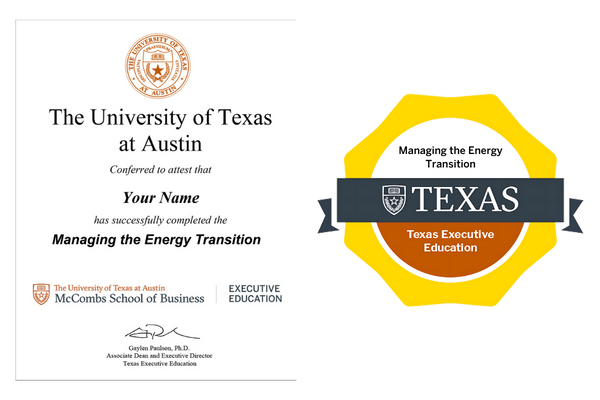Managing the Energy Transition
IMPLEMENT SUSTAINABLE ENERGY SOLUTIONS
Pressing climate change concerns and geopolitical tensions have accelerated the urgency to embrace cleaner energy alternatives over conventional energy sources. To tackle this change, organizations are looking toward professionals with strong leadership skills who can effectively collaborate with stakeholders to steer through challenges. Energy leaders need to be proficient at navigating complex regulatory frameworks while assessing the economics of different renewable energy sources.
The Managing the Energy Transition program from Texas Executive Education at the McCombs School of Business is designed by expert faculty with global, cross-industry experience and active involvement in the debates and policymaking in the energy sector. Through a combination of expert insights, application-based activities, case studies, and peer learning, the six-week curriculum empowers professionals to manage trade-offs and make informed decisions as they drive their organizations toward an efficient and equitable energy transition.
UT AUSTIN: A LEADER IN ENERGY RESEARCH AND EDUCATION
The state of Texas has developed abundant renewable energy resources, generating more than a quarter of the nation’s electricity from wind power, and is a leader in solar energy production. The University of Texas at Austin (UT Austin) is core to this success and is the nation’s number-one energy research university. Its future-thinking faculty champion collaboration and innovation. Over 20 energy centers and programs, at UT Austin facilitate an integrated, systems-oriented approach to meeting the energy challenges of today and the future.
UT Austin’s Energy Institute has funded more than US$300 million in energy research on a broad spectrum of issues. It is also home to the KBH Energy Initiative, a preeminent energy center at the intersection of energy business, law, and policy. This diverse research footprint is pioneering novel ways to enable energy sustainability. UT Austin has the largest alumni network of energy professionals in the nation and has contributed almost 14% of the US talent pool currently working in the energy sector.
WHAT YOU WILL LEARN
The Managing the Energy Transition program will enable you to:
Define drivers and impacts of energy transition, including scientific evidence market forces, policy, risk, and geopolitical shocks.
Compare the cost, reliability, and cleanliness of net-zero technologies to assess uncertainty and trade-offs in the context of the transition.
Identify economic trade-offs between the impact of climate change and the macroeconomic cost of decarbonization.
Analyze the effectiveness and impact on cost due to impacts of regulatory policy choices for achieving net- zero goals.
Examine scenario analysis planning in making informed decisions and mitigating risk in the energy transition.
Provide strategic recommendations for navigating change in today’s energy markets.

PhD, The Rex G. Baker Centennial Chair in Natural Resources Law, University of Texas School of Law; Professor of Business, Government and Society, McCombs School of Business
"As the energy sector moves towards net zero, organizations face the challenge of balancing the urgency to decarbonize with the practicalities of effectively integrating gr...
WHO IS IT FOR?
The program is ideal for business leaders and senior professionals in the energy industry who are:
Keen to understand the drivers, trade-offs, and policy choices associated with energy transition in order to align organizational energy strategies with sustainability goals
Seeking tools and techniques to drive operational excellence, adopt new technologies, and maximize profitability
Looking to stay abreast of emerging trends and complex regulatory requirements to guide organizations toward policy compliance
Interested in exploring various policy approaches for reducing carbon emissions while balancing economic considerations with environmental goals
CURRICULUM
The six-week program delves into the scientific and political forces driving energy transition as well as the financial and environmental trade-offs that need to be addressed. The curriculum, organized into weekly modules, offers flexibility in accessing program materials. Weekly activities, including faculty lectures, case studies, and real-world scenarios, equip participants with practical tools to manage scenario planning and decision making.
KEY PROGRAM FEATURES

Expert Faculty
Gain in-depth insights from world-renowned faculty who are also expert practitioners with long-standing industry experience.

Peer Learning
Interact and share insights with like-minded business leaders in the energy industry from around the world.

Real-World Examples
Draw on the broad expertise of faculty and on proprietary frameworks and use cases from across the entire energy ecosystem, all of which serve to make your learnings holistic.

Energy Transition Playbook
Create a resourceful playbook by applying program learnings to your organization’s challenges in navigating the path to net zero.

Weekly Office Hours
Join optional live weekly office hours with a program leader to deepen your understanding and clarify your questions.
Certificate of Completion
Earn a certificate of completion from The University of Texas at Austin, McCombs School of Business, a leader in energy research and education.
MEET THE FACULTY

The Rex G. Baker Centennial Chair in Natural Resources Law, University of Texas School of Law; Professor of Business, Government and Society, McCombs School of Business
David Spence focuses his research and teaching on business–government relations and the regulation of business, particularly energy and environmental regulation. Spence has ta...

Professor of Public Affairs, UT Austin
Sheila Olmstead is a professor at the Lyndon B. Johnson School of Public Affairs at UT Austin, a visiting fellow at Resources for the Future in Washington, DC, and a senior fe...

Professor of Information, Risk and Operations Management; the Fondren Foundation Centennial Chair in Business, the McCombs School of Business at UT Austin
James Dyer’s research and teaching interests include risk management, multiple-criteria decision making, and capital budgeting. He has won multiple academic awards, including ...

CERTIFICATE
Upon successful completion of the program, participants will be awarded a certificate and a digital badge from the University of Texas at Austin, McCombs School of Business.
After successful completion of this program, your digital certificate will be emailed to you in the name you used when registering for the program. All certificate images are for illustrative purposes only and may be subject to change at the discretion of the University of Texas at Austin.
Note: This program does not grant academic credit or a degree from The McCombs School of Business.
FAQs
Didn’t find what you were looking for? Write to us at learner.success@emeritus.org or Schedule a call with one of our Program Advisors or call us at +1 361 344 4980 (US) / +44 138 443 7887 (UK) / +65 3138 4361 (SG)
Early registrations are encouraged. Seats fill up quickly!
Flexible payment options available.
Starts On
